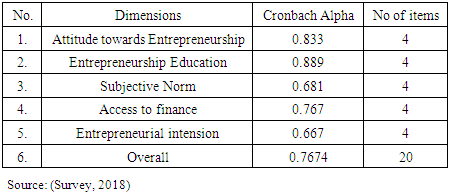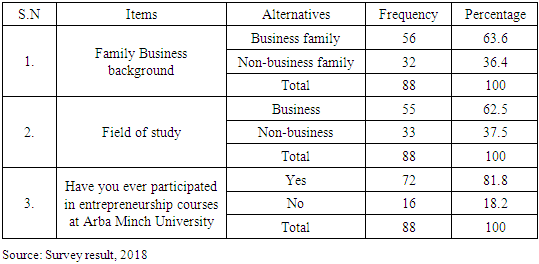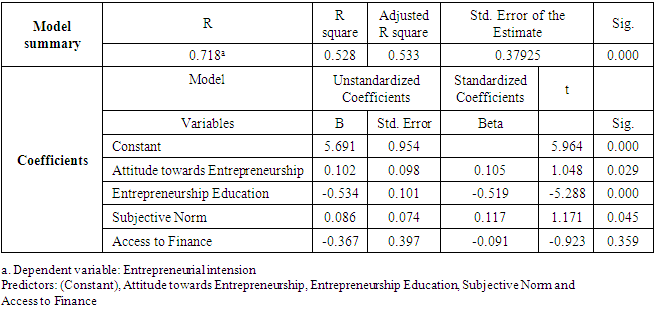-
Paper Information
- Paper Submission
-
Journal Information
- About This Journal
- Editorial Board
- Current Issue
- Archive
- Author Guidelines
- Contact Us
Management
p-ISSN: 2162-9374 e-ISSN: 2162-8416
2020; 10(1): 23-34
doi:10.5923/j.mm.20201001.04

Determinants of Entrepreneurial Intention towards Self-employment in the Case Study of Arba Minch University Graduating Class Students
Berhanu Tereda Mengesha
Lecturer in Management Department, Wolkite University, Ethiopia
Correspondence to: Berhanu Tereda Mengesha, Lecturer in Management Department, Wolkite University, Ethiopia.
| Email: |  |
Copyright © 2020 The Author(s). Published by Scientific & Academic Publishing.
This work is licensed under the Creative Commons Attribution International License (CC BY).
http://creativecommons.org/licenses/by/4.0/

Entrepreneurship has been considered as a possible solution to address poverty in developing countries. It is a means of coping with unemployment problems by providing new job opportunities for those jobless people. The aim of the study is to identify factors which determine the entrepreneurial intention of the students towards self-employment. Explanatory research was designed to investigate what variables determine the entrepreneurial intension of graduate class students towards self-employment. For the purpose of the study the researcher used only primary data collected through questionnaire from 93 graduating class students of business and non-business field of specialization of the university. Thus, 93 respondents were selected using proportional stratified simple random sampling technique from the total of 4049 graduating class students of Arba Minch University. The inferential statistical output shows that, attitude towards entrepreneurship as a career option, family business background and subjective norm are a positive significant effect on entrepreneurial intention of the graduating class students. Whereas, entrepreneurship education and financial resource are a negative significant effect on entrepreneurial intention of the graduating class students. Finally, the researcher recommended that entrepreneurship course did not bring a significant attitudinal change among the students. Therefore, minister of education and higher education institutions in general; entrepreneurship directorate office of the university in particular, better to re - assess entrepreneurship course in terms of its content, mode of delivery and assessment methods.
Keywords: Entrepreneurship, Entrepreneurial intention, Determinants, Arba Minch University
Cite this paper: Berhanu Tereda Mengesha, Determinants of Entrepreneurial Intention towards Self-employment in the Case Study of Arba Minch University Graduating Class Students, Management, Vol. 10 No. 1, 2020, pp. 23-34. doi: 10.5923/j.mm.20201001.04.
Article Outline
1. Introduction
- Entrepreneurship is becoming a very relevant instrument to promote economic growth and development in different regional and national economies [1]. According to Willie and Olande [2] entrepreneurship is a major catalyst or accelerator that drives the economy of most nations. Besides being the engine by which new ideas and novel approaches are introduced continually into businesses and the market place, entrepreneurship guarantees economic returns from diverse forms of activities. In a more specific sense, entrepreneurship is the vehicle on which innovation rides.Entrepreneurship has increasingly evolved to such an extent not only becoming a career but also a possible solution to address poverty in developing countries. It is a means of coping with unemployment problems by providing new job opportunities and it is also seen as an engine of economic progress and job creation [3]. Nowadays, unemployment is one of the main social and economic problems that many nations face. One strategic way to get over this problem is to increase the entrepreneurship spirit especially for unemployment graduates [4]. South Africa faces massive challenges with its high levels of unemployment among the youth especially university graduates due to lack of work experience, low skills base and education [5]. According to Ekpoh and Edet [6], entrepreneurship has become one of the main alternatives for students after they graduate. This is because entrepreneurship offers many benefits, such as setting up one’s own business and the possibility of having significant financial rewards than working for others. Fostering entrepreneurship through attitude and skill has also received increasing attention from universities in many countries. Entrepreneurial skill at tertiary level has also become an essential component of many curriculums in private and public higher learning institutions. Since future entrepreneurs can be found amongst those who are currently undergoing their educational process at the universities, entrepreneurship education has been used as one of the most effective ways to promote the transition of graduates into the world of entrepreneurship [7]. Today entrepreneurship is offered in most of the universities in different countries as part of the curriculum but it is evident that levels of entrepreneurship are still not improving specially in many developing countries [8]. As a reason, the curriculum and its feature is the major problem. The researcher pilot survey shows that, our students are not interested to take the lesson or entrepreneurship course and entrepreneurship related trainings because of the course curriculum contents and teaching and assessment is delivered through the normal classroom methods, which is more of theory based; it does not provide practical clue; due to this, they are not initiated. Yet, they are waiting the government or some company else offering of jobs. Many researches have been done on the drivers of entrepreneurial aspirations and the transformation from entrepreneurial aspiration to new venture creation. There are evidences that aspiring entrepreneur do have different demographic characteristics such as age, gender, self-employment experience, family background, education background, strength of financial resources, dissatisfaction with hours of work and pay etc. It also associated with the psychographic factors such as attitude toward risk, achievement motive, tolerance for ambiguity, locus of control etc. [9]. Other geographical factors are organization, unemployment, the environment and nature of business. According to Bird [10], factors that determine intentions are attitude, subjective norms, perceived behavioral control, perceived control liability of behavior, self-efficacy, perceived desirability and feasibility.In the developing countries the critical problems of the governing body was unbalancing of population growth with the available job opportunity delivered for them. Now a day the capacity of higher institution towards producing graduating student to the market is not go in line with the available jobs in our country Ethiopia. The number of undergraduate students graduating from Public and Private Higher Education institutions is increasing from time to time. This the major challenging factor and unmanageable problem of our country, therefore, entrepreneurship is the most important option for students. The education policy of Ethiopia aims at equipping students with the necessary skill and knowledge that would help them to become an entrepreneur in the future. Basically, the end goal of educating citizens is not only to become an employee in private and public organization but also to become an entrepreneur by using knowledge and skill acquired through education [11]. The higher interest for self-employment by those with entrepreneurial experience indicates the value of providing students with entrepreneurial experience throughout the course curriculum. This will not only develop the students’ relevant skill set but also enhance the perceived feasibility of self-employment [12].Motivating university students towards a culture of entrepreneurship and innovation can have an impact both locally and internationally. Undergraduate students who pursue their own ideas through entrepreneurship are more likely to find satisfaction in their careers, as well as impacting job creation externally [13]. According to Werotaw, [14], Ethiopia is one of the developing countries in the world due to a lack of entrepreneurship motivational development. As the researcher indicted that, we are failure to become entrepreneur instead of need of jobs delivered by the government or other bodies. Still, we have in self and group conflict in search of job opportunity created by other. There has been a key gap between government’s policy and graduating students feeling towards work opportunity. Now a day, government need to develop student`s self-initiation to start their own business. However, it becomes difficult to come up with positive graduate class attitude and motivation. The main gap of this investigation is on student’s current attitude and the current government policy on the ground level. In general the main purpose of this study was to assess the graduating student’s motive to start their own business among students in a higher education institution in the case study of Arba Minch University 2018 graduating class students. Finally, the researcher tested the following hypotheses; H1: There is a significant relationship between attitude towards entrepreneurship as a career and entrepreneurial intentions.H2: Entrepreneurship education has a strong effect on entrepreneurial intentions among students. H3: Family business background has a strong effect on entrepreneurial intentions.H4: There is a significant relationship between subjective norm and entrepreneurial intentions.H5: There is a significant relationship between financial factor and entrepreneurial intentions.
2. Literature Review
- Definition of Entrepreneur and EntrepreneurshipEarly this century, Joseph Schumpeter [15], the Moravian-born economist writing in Vienna, gave us the modern definition of an entrepreneur as the person who destroys the existing economic order by introducing new products and services, by creating new forms of organization, or by exploiting new raw materials. According to Schumpeter [16], that person is most likely to accomplish this destruction by founding a new business but may also do it within an existing one. Whereas, entrepreneurship can also be defined as the process of creating something different and better with value by devoting the necessary time and effort by assuming the accompanying financial, psychic and social risks and receiving the resulting monetary reward and personal satisfaction. In this case an individual should come up with something different and better in order to be named as entrepreneur.Entrepreneurial IntentionNew venture creation has been receiving greater attention in recent years because of its importance in economic development. The new venture creation contributes not only to the economic development, but also provides new opportunities for prospective entrepreneurs by delivering information and knowledge for the next business creation. Entrepreneurial intention is a primary step to create new venture in the entrepreneurial process [17]. According to Thompson [18], Entrepreneurial intention is a self-knowledge conviction by a person who intends to set up a new business venture and consciously plans to do so at some point in the future. If one knows entrepreneurial intention and its level of existence among individuals, then she/he can predict whether enterprising students exist in the university population or not. This implies that students with entrepreneurial intention will end up in setting business ventures [19]. According to Ertuna and Gruels, [20] university students with an entrepreneurial family have significantly higher entrepreneurial intention to become an entrepreneur than those students who have non-entrepreneurial family. Wang and Wong [21] study on university students in Singapore, found that students from business parents have greater interest in entrepreneurship that none business parent students. The intentions to carry out certain behaviour are shaped and affected by different factors, such as, needs, values, wants, habits and beliefs [22]. Prior entrepreneurial experience has also been seen as a factor that influences entrepreneurial intention [23]. Researchers have argued that entrepreneurship is context specific, and therefore, entrepreneurial intention is affected by individual and sociocultural factors [24]. Thus, besides self-efficacy, other factors, such as pro-activeness, risk propensity (individual factors), perceived opportunities and role models (sociocultural factors), could also act as influencing factors of entrepreneurial intention [25]. According to Arenuis and Minnit [26], new venture creation and entrepreneurial decision never take place in a vacuum, but they are affected by environment in which they were took place. Environmental conditions are the main factors that are strengthening or weakening intention of prospective entrepreneur. Accordingly, providing appropriate entrepreneurial environments to raise the intention will also increase the new venture creation rate. Therefore, creating appropriate entrepreneurial environments in which prospective entrepreneurs raise their vision of new venture creation and make a decision to realize the vision is the first step to activate entrepreneurship [27]. Entrepreneurship EducationThe history of entrepreneurship education dates back to the 1930s in Japan through the works of a Japanese professor though most of modern day entrepreneurship sources and programmes were pioneered and introduced in schools by American universities [28]. The aim of these programmes was to produce graduates who were able not only to identify opportunities but to turn those opportunities into businesses [29]. Kaltenecker, Hoerndlein and Hess [30] defined entrepreneurship education as the process of equipping individuals with capabilities to develop insights, identify opportunities, skills and knowledge for action. Several studies on entrepreneurship have established a strong relationship between entrepreneurial activity, economic performance and the need to create business climate at the global level, wherein entrepreneurship can flourish [31]. Education can affect students’ attitudes towards entrepreneurship and their entrepreneurial self-efficacy. Lack of entrepreneurial education leads to low level of entrepreneurial intention of students [32]. Hong et al. [33] remarked that the need for entrepreneurship education becomes critical because such an education may directly affect the decision-making capabilities of the students when they become managers, which in turn will lead to the reduction in the risk of failure and increasing the benefits for all. According to Liñán, Moriano and Zarnowska [34], entrepreneurial education entails those activities that involve the development of skill-based knowledge, approaches, attitudes and qualities. During the education process, the focus must be on the skill sets that are required to be imparted in accordance with the age and development of the student concerned. The latest development in higher education worldwide has been characterized by the proactive introduction of innovations in management, teaching and curriculum development [35]. According to Nieuwenhuizen and Groenewald [36], strong evidence exists that individuals who attended entrepreneurship courses have a high propensity to start their own businesses compared to those studying other courses.According to Redfort and Trigo [37], Entrepreneurship education can have three key roles in promoting an entrepreneurial society. It may act as a general advocate for mindset and type of creativity employed in entrepreneurial endeavors and presenting students with entrepreneurship as a possible career choice. Moreover, it has a skill development role by assisting students in developing the technical and business skill- set necessary to have a successful entrepreneurial career. Finally, it may have a scientific development role by contributing for the advance the body of knowledge associated with the entrepreneurial phenomenon. There is awesome evidence in the body of knowledge with regard to the impact of education on economic development of countries and entrepreneurship as a career choice among citizens in developed countries. According to Mentoor and Friedrich [38], enterprise education serves three objectives. Firstly, to increase the understanding among students about what entrepreneurship entails. Entrepreneurial education is very important and necessary for all segments of society. Secondly, it is about preparing individuals for the world of work. It implies teaching students on how to become entrepreneurial, take responsibility about their careers and personal lives. Finally, enterprise education serves to prepare individuals to be entrepreneurs and managers. The students should be taught how to become entrepreneurs, to assess whether they have the potential to be entrepreneurs, and also assist them in developing business management skills. Students should be encouraged to be creative in their thinking, and this can be done from the lower levels within the institutions of higher learning. The enterprise education needs to move from product orientation to customer focus, which has proved to have a major impact on the development of entrepreneurial skills.A study by Souitaris, Zerbinati and Andreas [39] found that entrepreneurship education stimulates students’ subjective norms and intentions towards entrepreneurship by providing them with knowledge, skills and a sense of belief that inspire them to choose entrepreneurship as a career. In another study by Basu and Virik [40], it was found that entrepreneurship education improves attitudes of students towards entrepreneurship. These results were also confirmed in another study by Ediagbonya [41] whose results showed that by developing skills, knowledge and motivation in university students for them to successfully engage in entrepreneurship activities, entrepreneurship education positively impacts on the attitudes of students towards entrepreneurship.Entrepreneurial Attitudes Research advocates that the success of entrepreneurship as a process can be highly attributed to attitudes towards this process. Attitudes play a critical role in shaping innovation and behaviour of individuals. The Global Entrepreneurship Monitor (GEM) global report Bosma and Levie [42] define entrepreneurial attitudes as attitudes towards entrepreneurship. It is about the extent to which people think there are good opportunities for starting a business. Attitudes play an important role in establishing entrepreneurial activity within a population. The attitudes relevant to entrepreneurship includes willingness to bear the level of risk that individuals might be willing to bear and individuals perceptions of their own skills, knowledge, and experience in business creation. Entrepreneurial attitudes can influence entrepreneurial activity, but can also be influenced by entrepreneurial activity. Entrepreneurial attitudes are important because they express the general feelings of the population toward entrepreneurs and entrepreneurship. More important is that if the national attitudes toward entrepreneurship are positive, this will generate cultural support, help, financial resources, and networking benefits to those who are already entrepreneurs or want to start a business [43].According to Nybakk and Hansen [44], there are two important elements of entrepreneurial attitudes, namely the ability to recognize opportunities and the ability to take calculated risk. It is further argued that people with entrepreneurial attitudes are more likely to start-up new business activities. This implies that risk-takers are more likely to initiate a new activity and risk attitude affects the selection of individuals into entrepreneurial positions. Entrepreneurship education is viewed as a form of training in entrepreneurial knowledge, behaviour, attitudes and skills [45]. As a result, students’ attitudes towards entrepreneurship and entrepreneurship education can be measured in terms of three components of entrepreneurship attitudes namely cognitive, affective and behavioural attitude components [46]. The cognitive component relates to beliefs, thoughts and knowledge students have about entrepreneurship and entrepreneurship education that shape their attitudes and behaviours [47]. The affective component relates to feelings and emotions about entrepreneurship and entrepreneurship education, that is, how a person sees the desirability or relevance of something and hence whether eventually they either like it or not [48]. The behavioural component relates to actions, overt responses and willingness to respond to or accept something [49].Family BackgroundA person is most likely to be influenced by a particular group of individuals such as family members, friends, peers, and others close ones in one’s life. For example;- people who growth up around a society or family that runs business or where family business is practiced are likely to learn and model entrepreneurial tendency, perceiving it to be feasible, more socially desirable and rewarding than formal employment in an established organization. The desire to start or not to start a business may also be influenced by the meaning that one attaches to business; which in turn is socially generated and sustained. As for university students, this is very important as they may be at the stage to decide on their career preferences [50].Family background is important variable that has been considered to contribute to the entrepreneurship intention. Generally, individuals who have families with business tend to show higher attitude towards entrepreneurship than those families that don’t have business undertakings [51]. Hisrich [52] state that the family involvement in business tends to influence the students future career to be involved in business too.Subjective NormAjzen [53], social norm refers to the perceived social pressure from one’s peer and significant others impacting ones intention to perform or not to perform a specific behavior. Influences of other people that are close to a person can have influence on his or her intention to act in a certain way. The theory of planned behavior terms this as subjective norms the perceived social pressure to perform or not perform the behavior. It can be individual family expectation to become entrepreneurs that influences the desirability of the same individual in setting up an own business. The more supportive the social norms are, the higher the intention [54]. The major challenge when measuring social norms is identifying the correct reference group. The reference group for an entrepreneur or a potential entrepreneur is not necessarily only family and friends, but may actually include colleagues and business partners [55].Access to Finance An appropriate set of resources is required to identify entrepreneurial opportunities with the greatest potential returns. Entrepreneurs and entrepreneurial firm will identify those opportunities that rivals have not observed or have underexploited. To build and maintain such competitive advantage, an entrepreneur or firm must have access to entrepreneurial resources that current and potential rivals cannot easily duplicate [56]. According to Timmons & Spinelli [57], resources play a fundamental role in any successful venture, because in creating economic opportunities, entrepreneurs need resources to develop these opportunities. Entrepreneurs take calculated risks with fewer resources in order to grab and utilize the opportunity. Among the tangible and intangible resources; financial resources is the most important resources and it is the back bone of any business activities.According to Kristiansens and Indart [58], lack of access to capital and credit scheme, and the constraints of financial systems are regarded by potential entrepreneur as main hindrances to business innovation and success in developing economies. Financial constraints have a negative impact on the decision to become an entrepreneur, and lack of financial support is an obstacle to start a new business which has direct effect on the fact of being self-employed [59]. According to Greene [60], access to finance is necessary to start firm. It is also perceived as one of the impediments for younger people to start their own business. This study considers access to finance as startup capital required for starting new business.
3. Methods and Materials
- Explanatory research was designed to investigate what variables determine the entrepreneurial intension of graduate class students towards self-employment. For the purpose of the study the researcher used only primary data collected from 55 business students and 38 non-business students. Thus, 93 respondents were selected using proportional stratified simple random sampling from the total of 4049 graduating class students of Arba Minch University. The data collection technique used was structured questionnaire consisting of both closed-ended and open ended questions. The collected data was presented, interpreted and analyzed by using of both descriptive and inferential statistical tools. The consistency of the variables is checked with the help of Cronbach’s alpha statistics. According to McKinley, et al [61] state that for comparing groups, Cronbach’s alpha values of 0.7 to 0.8 are regarded as satisfactory, though lower thresholds are sometimes used in literature. Nunnaly [62] has stated that 0.5 is a sufficient value, while 0.7 is a more reasonable Cronbach’s alpha. Therefore the following table shows that the reliability tests result of the variables.
|
 Where; Y stands for Entrepreneurial intentionX1 stands for Attitude towards EntrepreneurshipX2 stands for Entrepreneurship EducationX3 stands for Subjective NormX4 stands for Access to finance
Where; Y stands for Entrepreneurial intentionX1 stands for Attitude towards EntrepreneurshipX2 stands for Entrepreneurship EducationX3 stands for Subjective NormX4 stands for Access to finance Is a constant term
Is a constant term error term
error term and
and  are coefficients of the independent variables
are coefficients of the independent variables4. Discussion and Results
- A total of 93 questionnaires were distributed to the target respondents. Out of 93 questionnaires; only 5 questionnaires were not valid for analysis. This means 88 respondents were properly filled the questionnaires and it gives a response rate of 95%; among the whole responses 40% were from non-business students and the rest 60% were from business students.Profiles of the Respondents The respondent’s profile was described by gender, age, family business background, field of study and participated in entrepreneurship courses. Demographic variables were used to know the intention of graduating class students towards self-employment.Gender The role of gender study in any business assumed to be very important due to the proportional composition and different roles that each group can contribute to the success of the business in particular and to the development of the nation as a whole.
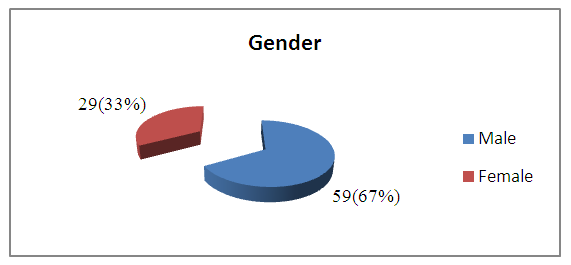 | Figure 1. Sex composition of the respondents (Source: Survey result, 2018) |
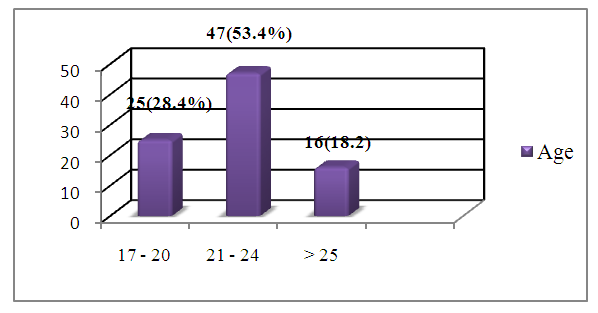 | Graph 1. Age of the Respondents (Source: Survey result, 2018) |
|
|
|
|
|
5. Conclusions
- Now a day, the most difficult socio-economic problem facing leaders particularly in Africa is the growing number of unemployed youth. The capacity of higher institution towards producing graduating student to the market is increasing from time to time; this is not go in line with the available jobs in our country Ethiopia. This was creating a number of teaming youth without jobs, thereby affecting their socioeconomic status. Therefore, this study tried to identify the determinants of entrepreneurial intention towards self-employment among 2018 university graduating class students in Arba Minch and finally given the following conclusion.There is a significant difference in entrepreneurial intention was found between male and female students. In the case study area, male students have higher entrepreneurial intention than female. According to Brush [74], men are more inclined towards entrepreneurial business than women with similar background. Regarding the age of the respondents, most of graduating class students are young and found at productive working age group. The previous studies indicate that young people are more prone to entrepreneurial activity than old people and it is assumed to be healthier and can engage in a riskier deal. There is a significant difference in entrepreneurial intention was found between students from business family background and non-business family background. The finding indicates that students from business family background have higher entrepreneurial intention than non-business family background. This indicates that, parents’ entrepreneurial background plays a critical role in entrepreneurial decision of the graduating class students. In the other case, the finding indicates that there is a no significant difference in entrepreneurial intention between students those who had took entrepreneurship education and those who had not took entrepreneurship education. The regression results indicated that attitude towards entrepreneurship as a career option, and subjective norm are a positive significant effect on entrepreneurial intention of the graduating class students. Whereas, entrepreneurship education is a negative significant effect on entrepreneurial intention of the graduating class students. This is because, the content of the course curriculum, teaching and assessment are delivered through the normal classroom method, which is more of transferring theoretical knowledge but not practical clue such as creativity, competencies, development of skills and a change in attitudes. Finally, the finding of the study show that, access to finance has no significant effect on the entrepreneurial intention of the graduating class students.
6. Recommendations
- Based on the finding of the study, the researcher forwards the following suggestions to the concerned bodies. Currently in Ethiopia number of graduating students from higher institution increasing time to time. The ruling party of the country was in the problem of relating graduate students need of job opportunity in their respective field of study; this will uplift the number of youth unemployment in the country. Therefore, the government of Ethiopia in general better to modify formal education` curriculum in higher institution to promote entrepreneurship. Entrepreneurship education can affect students’ attitudes towards entrepreneurship and their entrepreneurial self-efficacy. But, the finding of the study indicates that there is no significant difference in entrepreneurial intention between students those who had took entrepreneurship course and those who had not took entrepreneurship course. This is because entrepreneurship course did not bring a significant attitudinal change among the students who took the courses. Therefore, minister of education and higher education institutions in general; entrepreneurship directorate office of the university in particular, better to re - assess entrepreneurship course in terms of its content, mode of delivery and assessment methods.Parents’ entrepreneurial background plays a critical role in entrepreneurial decision. This means that Students whose families have business background is more likely to start a business in the future compared to those whose family had no business background. Therefore, skill improvement mechanisms such as seminar, workshop and experience sharing program are better to arrange for the purpose of improving the entrepreneurial intention of students who have non business family background. Finance is the back bone of any type of business activities but the finding of the study shows that, finance is the negative effect on the entrepreneurial intention of the graduating class students. Therefore, the government and any other stakeholders better to minimize financial barriers by arranging credit facilities collaborating with banks and micro finance institutions in order to improve the entrepreneurial attitude of graduating class students.
7. Limitation and Future Research Implication
- This research mainly focused on final year undergraduate students of both business and non-business students of Arba Minch University only. Therefore, the future researchers better to consider fresh, junior and post graduate students of other universities. The regression output indicates that 52.8 percent of the variation in the entrepreneurial intension of the students can be explained by the afforminshied independent variables. The remaining 47.2 percent of the variance is explained by other variables not included in this study. Therefore, the future researchers better to include other variables which determinant the entrepreneurial intension of the students.
 Abstract
Abstract Reference
Reference Full-Text PDF
Full-Text PDF Full-text HTML
Full-text HTML